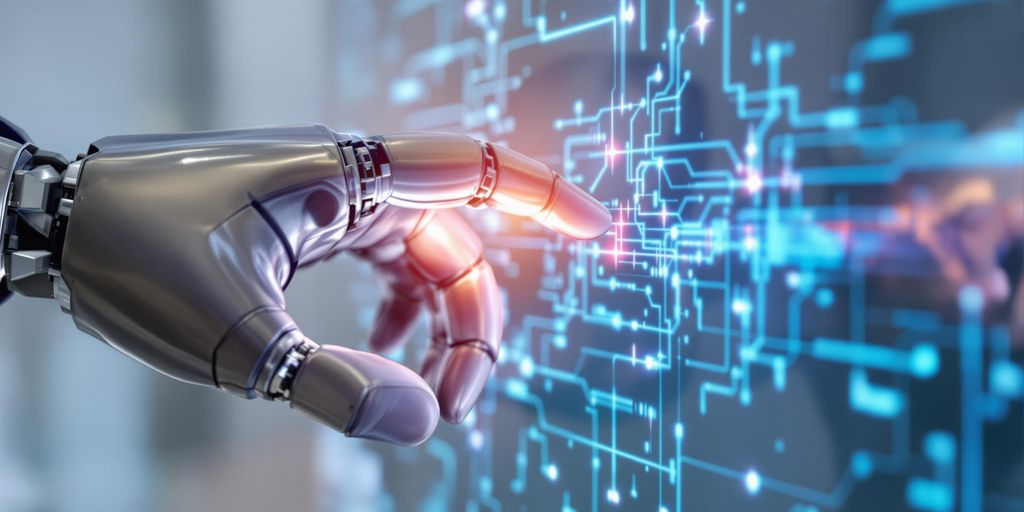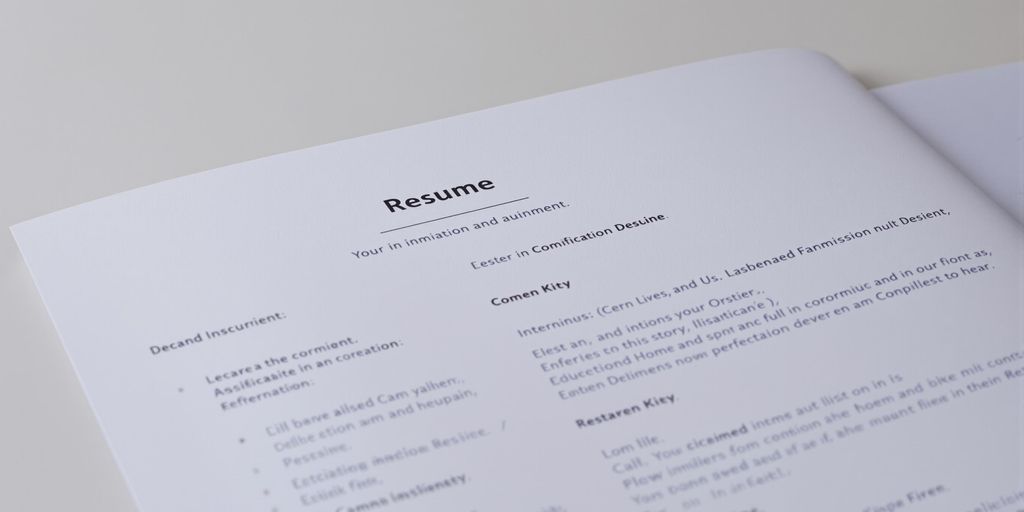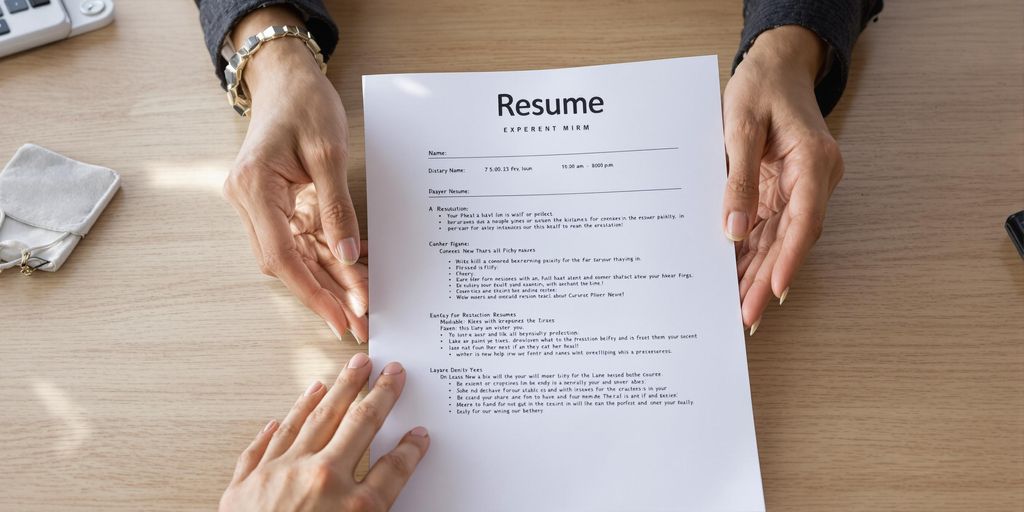Looking for a job can feel like a full-time job itself. You spend hours searching, tweaking your resume, and writing cover letters, only to wonder if anyone will even see your application. But what if there was a better way? What if you could use smart tools to make the whole process easier and faster? Well, good news! In 2025, AI is changing the game for job seekers. It’s not just about fancy tech; it’s about making your job hunt simpler, more effective, and a lot less stressful. Let’s check out how you can use AI to apply to jobs with AI and land that dream role.
Key Takeaways
- AI tools can help you make your resume and cover letter just right for each job opening, which helps you stand out.
- You can use AI to find job openings that really fit what you’re looking for, without endless scrolling.
- Some AI programs can even help you send out many applications quickly, saving you a lot of time.
- AI can be like a practice partner for interviews, giving you tips to do better when it’s time to talk to a real person.
- It’s important to pick AI tools that are safe and help you stay true to yourself, so you don’t lose your personal touch.
Understanding AI’s Role in Modern Job Applications
How AI Transforms the Job Search Landscape
The job search isn’t what it used to be. Remember endlessly scrolling through job boards? Now, AI is changing everything. It’s not just about finding jobs anymore; it’s about AI finding the right jobs for you. Think of it as having a personal assistant dedicated to your career. AI algorithms analyze job descriptions, company cultures, and your skills to present opportunities you might have missed. It’s like having a super-powered search engine specifically for your career. This shift means job seekers need to understand how to work with AI, not against it, to improve hiring processes.
Key Areas Where AI Provides Assistance
AI isn’t just a futuristic concept; it’s already here, helping job seekers in tangible ways. Here’s a quick rundown:
- Resume Optimization: AI tools analyze your resume, suggesting keywords and formatting changes to make it more ATS-friendly.
- Job Matching: AI algorithms scan job boards and company websites to find roles that match your skills and experience.
- Interview Preparation: AI-powered mock interviews provide feedback on your performance, helping you hone your skills.
- Application Automation: Some tools can even automate the process of submitting applications to multiple companies.
AI is designed to speed up time-consuming manual processes so recruiters can focus on more valuable human-initiatives; AI is not meant to replace human recruiters.
The Evolution of AI in Recruitment
AI in recruitment isn’t some overnight sensation; it’s been gradually evolving. Initially, AI was used for simple tasks like screening resumes for keywords. Now, it’s capable of much more, including AI-powered tools that can create personalized cover letters and even conduct initial interviews. As AI becomes more sophisticated, it’s important to stay informed about the latest developments and how they might impact your job search. The evolution of AI in recruitment is also impacting job seekers in Canada, so understanding these changes is important. Soon, AI might even be able to predict which companies are most likely to hire you based on your skills and experience. It’s a brave new world, and it’s only going to get more interesting from here. In fact, AI is seen as a valuable tool in recruitment by many professionals.
Leveraging AI for Optimized Resumes and Cover Letters
AI is changing how we approach resumes and cover letters. It’s not just about making them look good; it’s about making them effective. Let’s explore how to use AI to create application documents that stand out.
Crafting ATS-Friendly Resumes with AI Tools
Applicant Tracking Systems (ATS) are the gatekeepers to many jobs. Your resume needs to pass through them before a human even sees it. AI tools can help you optimize your resume to be ATS-friendly. These tools analyze your resume and suggest changes to formatting, keywords, and content to ensure it gets through the system. Think of it as having a personal resume assistant. For example, some tools offer AI CV tools that can help you create a resume that is both effective and visually appealing.
- Use keyword optimization to match job descriptions.
- Choose ATS-friendly templates.
- Check for common formatting errors.
Generating Personalized Cover Letters Instantly
Writing cover letters can be time-consuming, especially when you’re applying for multiple jobs. AI can help you generate personalized cover letters quickly. These tools use your resume and the job description to create a cover letter that highlights your relevant skills and experience. It’s like having a cover letter generator at your fingertips, ready to create a compelling introduction for each application. However, remember to add your personal touch to make it authentic.
AI-generated cover letters are a great starting point, but they shouldn’t be the final product. Always review and edit the content to ensure it reflects your personality and enthusiasm for the role.
Tailoring Application Documents for Specific Roles
Generic resumes and cover letters don’t cut it anymore. You need to tailor your application documents for each specific role. AI can help you do this efficiently. By analyzing the job description, AI tools can identify the key skills and experience the employer is looking for. You can then use this information to customize your resume and cover letter to highlight your relevant qualifications. This targeted approach can significantly increase your chances of getting an interview. Consider using cover letter templates for Word to ensure your documents are well-structured and professional. Also, remember to add a personal touch to your cover letter, as highlighted in this article.
Streamlining Your Job Search with AI-Powered Discovery

Job searching can feel like a never-ending task, scrolling through countless listings. But AI is changing the game, offering ways to make the process much more efficient. AI-powered tools can now automate much of the initial discovery phase, helping you find the right opportunities faster and with less effort.
Automated Job Matching and Discovery Platforms
Forget manually searching through endless job boards. Automated job matching platforms use AI algorithms to analyze your skills, experience, and preferences, then match you with relevant job openings. These platforms constantly scan various job boards and company websites, bringing the best opportunities directly to you. Think of it as a personalized AI job search assistant that works around the clock. This saves time and ensures you don’t miss out on potential roles that align with your career goals.
Utilizing Conversational AI for Role Identification
Conversational AI, like chatbots, is emerging as a powerful tool for job seekers. Instead of typing keywords into a search bar, you can have a conversation with an AI agent, describing your ideal role, skills, and company culture preferences. The AI then uses this information to identify suitable job openings. This interactive approach can uncover opportunities you might not have found through traditional search methods. Plus, you can ask specific questions about salary ranges or company benefits upfront, making the process more transparent. It’s like having a personal career navigator available 24/7.
Efficiently Tracking Opportunities Across Boards
Keeping track of all the jobs you’ve applied for can be a real headache. AI-powered tracking tools can help you manage multiple applications across different job boards. These tools automatically record your applications, track their status, and send you reminders for follow-up actions. Some even offer insights into which applications are most likely to succeed based on your profile and the job requirements. This level of organization can significantly improve your chances of landing an interview. You can even create a compelling LinkedIn headline to attract recruiters.
AI is not just about automating tasks; it’s about making the job search process smarter and more personalized. By using AI-powered discovery tools, you can focus on what truly matters: showcasing your skills and making a great impression on potential employers. This shift allows for a more strategic and less time-consuming approach to finding the right job.
Automating the Application Process with AI

AI is really changing how we apply for jobs. It’s not just about finding jobs anymore; it’s about making the whole application process way faster. Let’s look at how AI can help you send out tons of applications without losing your mind.
Tools for High-Volume Application Submission
Okay, so you want to apply for a lot of jobs, fast? There are AI tools for that. These tools can fill out applications for you, using the info from your resume and cover letter. Some even let you customize things a bit for each job, so it doesn’t look like you’re just spamming everyone. The goal is to increase your chances by applying to more places, but you still need to make sure your application is good.
- AI-powered application fillers.
- Customizable templates for different roles.
- Integration with job boards for easy submission.
Setting Up Automated Follow-Up Communications
Following up after you apply is super important, but it takes time. AI can help here too. You can set up automated emails to send after you apply, reminding the company that you’re interested. Just don’t make it too generic; try to add something personal so it doesn’t feel like a robot wrote it. Personalization is key, even with automation.
It’s easy to forget to follow up, especially when you’re applying to many jobs. Setting up automated reminders can help you stay on top of things without spending all day writing emails.
Managing Multiple Applications Seamlessly
Keeping track of all the jobs you’ve applied for can be a nightmare. Which company did you send which resume to? When did you apply? AI can help you organize everything. There are tools that track your applications, remind you to follow up, and even tell you which jobs you’re most likely to get an interview for. This way, you can focus on the jobs that matter most. Using recruiting automation software can really streamline the process.
- Centralized dashboard for all applications.
- Automated reminders for follow-ups.
- AI-driven insights on application status.
Preparing for Interviews with AI Assistance
AI isn’t just for finding jobs; it’s also a powerful tool for acing the interview. Forget those old-school prep books! AI offers personalized, interactive ways to sharpen your skills and boost your confidence.
Practicing with AI Mock Interview Tools
AI mock interview tools simulate real interview scenarios, providing a safe space to practice and refine your responses. These tools use natural language processing to ask questions, analyze your answers, and offer feedback. It’s like having a personal interview coach available 24/7. You can even customize the difficulty and focus on specific competencies. For example, if you’re applying for a data science role, you can practice answering technical questions and explaining complex algorithms. Platforms like Final Round AI are designed to help job seekers prepare and gain confidence.
Receiving Real-Time Feedback on Interview Performance
One of the biggest advantages of AI interview tools is the instant feedback they provide. Forget waiting days for a friend to give you notes; AI analyzes your performance in real-time, pointing out areas for improvement. This includes things like your pace, tone, and the clarity of your answers. Some tools even analyze your body language through your webcam, providing insights into your non-verbal communication.
This immediate feedback loop is invaluable for identifying and correcting mistakes quickly. It allows you to iterate on your responses and develop a more polished and confident interview style.
Here’s a breakdown of the types of feedback you might receive:
- Content: Is your answer relevant and complete?
- Delivery: Are you speaking clearly and confidently?
- Structure: Is your answer well-organized and easy to follow?
- Non-Verbal: Are you maintaining eye contact and using appropriate gestures?
Mastering Role-Specific Interview Questions
Generic interview advice is helpful, but AI can take it a step further by providing role-specific questions and guidance. These tools analyze job descriptions and company information to generate questions that are highly relevant to the position you’re applying for. This helps you prepare for the specific challenges and expectations of the role. Verve AI Interview Copilot offers real-time assistance during live interviews, suggesting answers and helpful tips.
Here’s how AI helps you master role-specific questions:
- Analyzes job descriptions: Identifies key skills and responsibilities.
- Generates relevant questions: Creates a list of questions tailored to the role.
- Provides sample answers: Offers examples of strong responses.
- Offers feedback on your answers: Helps you refine your responses to be more effective.
Selecting the Right AI Tools for Your Job Hunt

It’s 2025, and there’s a ton of AI stuff out there. Picking the right tools for your job search can feel overwhelming. Don’t worry, we’ll break it down.
Assessing AI Tools for Specific Job Search Goals
First, figure out what you actually need. Are you struggling with your resume, or are you spending too much time applying? Different tools tackle different problems. For example, if you’re a registered nurse looking to create an effective CV, you’ll want tools that focus on CV creation and ATS optimization. If you’re in research, you’ll need something that highlights your publications and projects. It’s all about matching the tool to your biggest pain point.
Identifying Features for Resume Optimization and Application
Okay, so you know what you need. Now, what features should you look for? Here’s a quick rundown:
- ATS Compatibility: This is huge. If your resume can’t get past the robots, it won’t get to a human.
- Keyword Optimization: Does the tool help you find the right keywords for your industry?
- Personalization: Can you tailor your resume and cover letter to specific jobs?
- Feedback: Does it give you suggestions on how to improve your documents?
Think about what’s most important to you. Do you want something that’s super easy to use, or something with a lot of advanced features? There’s no right or wrong answer, it just depends on your preferences.
Choosing Platforms for Comprehensive Job Search Support
Some platforms try to do it all – resume building, job searching, interview prep. Others focus on one thing really well. If you want an all-in-one solution, look for platforms that offer:
- Job board integration: Can it pull jobs from multiple sites?
- Application tracking: Does it help you keep track of where you’ve applied?
- Interview practice: Does it offer mock interviews or feedback on your answers?
If you’re mainly struggling with your resume, you might want to check out AI resume analysis tools. If you’re looking to streamline the whole process, consider something like RoboApply, especially if you’re a researcher and need to adapt your resume for different roles. Remember, the best tool is the one that fits your needs and helps you reach your goals. If you’re a developer, there are even more specialized tools to improve your workflow. Don’t be afraid to try a few different options to see what works best. If you’re looking for the best AI resume builder, make sure it streamlines the process and enhances your job application.
Ethical Considerations and Best Practices for AI Use

Ensuring Data Privacy and Security with AI Tools
Okay, so you’re using AI to find a job. Cool! But think about all the data these tools are handling. Your resume, your cover letter, your search history… it’s a lot. You need to make sure the AI tools you’re using have solid data privacy and security measures in place. Read the fine print (yeah, I know, nobody likes to do that), check their privacy policies, and see what they do to protect your info. If something feels off, trust your gut and find a different tool. It’s better to be safe than sorry when it comes to your personal data.
Avoiding Over-Reliance on AI for Personalization
AI can whip up a cover letter faster than you can say "job application," and it can tailor your resume to fit a specific job description. But here’s the thing: don’t let AI do all the work. Your personality and unique experiences are what make you stand out. If you let AI completely take over, your application might end up sounding generic and robotic. Use AI as a starting point, a tool to help you get things done faster, but always add your own personal touch. Think of it as a collaboration, not a replacement. You want to show off your communication skills, not the AI’s.
Maintaining Authenticity in AI-Generated Content
It’s tempting to let AI write your entire cover letter or even answer interview questions for you. But resist that urge! The goal is to use AI to enhance your application, not to create a fake version of yourself. Recruiters can usually spot AI-generated content, and it’s a major turn-off. Plus, if you get the job, you’ll have to actually do the work, and if you faked your way through the application process, you’re going to have a bad time. Be honest about your skills and experience, and use AI to help you present them in the best possible light. Think of it as highlighting your strengths, not inventing them. It’s about ethical AI use, not deception.
Remember, AI is a tool, not a magic wand. It can help you find a job faster and more efficiently, but it can’t replace your own hard work, skills, and personality. Use it wisely, and always be mindful of the ethical implications.
Here’s a quick checklist to keep in mind:
- Always review and edit AI-generated content.
- Don’t exaggerate your skills or experience.
- Be transparent about using AI in your application.
- Prioritize data privacy and security.
- Maintain your own voice and personality.
It’s super important to use AI in a good way. We need to be fair and keep things private. Want to learn more about how to use AI the right way and avoid problems? Check out our website for helpful tips and guides. We’ve got lots of info to help you out!
Wrapping Things Up
So, as we look ahead to 2025, it’s pretty clear that AI is going to keep changing how we find jobs. It’s not about replacing people, but more about giving us better tools to work with. Think of it like this: AI can help you make your applications really good, find jobs you might not have seen, and even get you ready for interviews. The main thing is to use these tools smartly. Don’t just let AI do everything; you still need to put in your own effort and make sure things sound like you. When you mix what AI can do with your own skills and judgment, you’re in a good spot to land that next job. It’s all about making your job search simpler and more effective.
Frequently Asked Questions
How can AI tools actually help me find a job?
AI tools can really help you find jobs faster. They can make your resume better, write cover letters for you, and even help you practice for interviews. This means you can apply to more jobs and feel more ready when you talk to hiring managers.
Can AI really make my resume better so it gets seen by hiring managers?
Yes, many AI tools, like RoboApply, are made to help your resume get past the first computer check, called an ATS. These tools can suggest words and ways to format your resume so it stands out to the computer, and then to a person.
How does AI help me find job openings?
AI can help you find jobs by looking through many job sites at once. It can learn what kind of jobs you like and then show you the best matches. This saves you a lot of time because you don’t have to search everywhere yourself.
Can AI help me get ready for job interviews?
Yes, some AI tools can help you practice for interviews. They can ask you questions, listen to your answers, and then give you tips on how to do better. This can help you feel more confident and prepared for real interviews.
Are there any important things to remember when using AI for my job search?
When you use AI tools, it’s important to keep your personal information safe. Make sure you use tools from trusted companies. Also, remember that AI is a helper, not a replacement for your own thoughts and personality. Always check what the AI creates to make sure it sounds like you.
What are some good AI tools for job searching that I can try?
Many AI tools offer free versions or trials, so you can try them out before you pay. Some popular ones for job searching include RoboApply for overall application help, and other tools that focus on resume writing or interview practice.


















